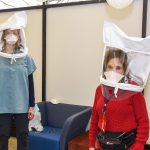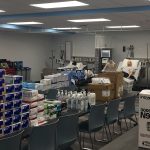Nursing faculty, students answer call to action amid COVID-19 outbreak
When Charles Yingling asked nursing colleagues two weeks ago if they would volunteer to work at UI Health during the COVID-19 pandemic, about 30 immediately responded yes.
That number has now jumped to more than 100.
College of Nursing faculty and students — all of whom are licensed RNs or APRNs — sprang into action, pitching in their expertise and expressing a willingness to support clinical care delivery during the COVID-19 pandemic.

“I was astonished by both the speed and volume of the response from the UIC Nursing community,” said Yingling, interim associate dean for practice and community partnerships in the College of Nursing. “I knew we would have a strong response. But I did not expect that we would have more than 100 volunteers in such a short period of time. I was filled with pride when I saw how our faculty and student community came together to support our nursing colleagues within the health system.”

More than 50 student and faculty volunteers have signed up to staff the University Health Service COVID-19 remote screening line, many signing up to work well over 40 hours in four-hour shifts.
“They will work remotely to call back university employees who have symptoms or COVID-19 contacts. Using an algorithm, volunteers will help evaluate if an employee should be tested, isolate at home or return to work,” Yingling said.
Fourteen graduate students also have signed on to work the triage line for patients at the health system on a scheduled basis. At least three affiliated faculty have volunteered three days per week to work in the COVID-19 clinic established at the UI Health Pilsen Family Health Center Lower West.
“I think (the response) is consistent with the culture we have in the College of Nursing, one that fosters community engagement and strong linkages with nursing practice,” said Yingling, who also is a clinical assistant professor in the department of health systems science.

In addition, UIC Nursing is lending UI Hospital three mid-fidelity manikins from the M. Christine Schwartz Experiential & Simulation Laboratory to cross-train nurses. The simulation lab also is donating necessary materials and equipment such as its gowns, gloves, masks, eye protectors, thermometer covers and hand sanitizer for health care workers to use. Also, the UIC College of Nursing-Urbana campus donated 120 isolation gowns, 150 surgical face masks and 80 boxes of non-sterile gloves to Clark-Lindsey, a continuing care retirement community bordering the University of Illinois campus.
Yingling said he is proud that the college has a strong practice mission that assures faculty are current in clinical practice and able to step in when needed in situations like this.
“I am thrilled to work with a group of nurses who are so strongly connected to the UIC community and committed to maintaining a partnership with nurses in practice throughout the health system,” he said.
Yingling said the rapid response to his initial call to action was amplified by faculty and students who urged their colleagues to respond quickly.
He credits his colleagues for contributing to the speed in which things are being done to help stem the pandemic.
“Given the volume of email surrounding the COVID-19 pandemic, it’s easy for a call to volunteer to slip by unnoticed,” Yingling said. “But faculty and students reached out within their networks to urge a robust response and our UIC-Nursing community delivered.”
